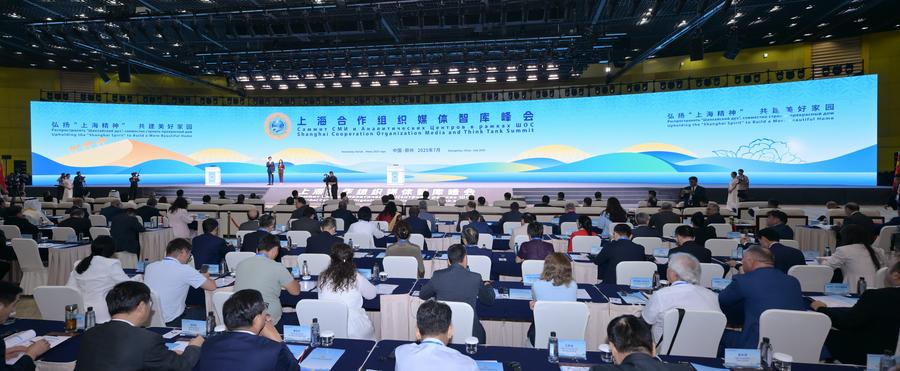
From July 23 to 27, 2025, a large-scale Forum of Media and Analytical Centers of the Shanghai Cooperation Organization (SCO) member states was held in Zhengzhou, Henan Province, China. The event took place under the general theme of “Promoting the Shanghai Spirit, Jointly Building a Beautiful Home” and became an important component of the expert and humanitarian dimension of China’s 2024–2025 SCO Chairmanship.
The Forum was organized under the auspices of Xinhua News Agency, with the support of the Chinese Academy of Social Sciences and the People’s Government of Henan Province. It brought together over 400 participants from 26 countries, including SCO member states, observers, and dialogue partners. Among the delegates were senior representatives and experts from major media outlets, think tanks, government institutions, international organizations—including the SCO Secretariat and UN agencies—as well as regional research institutes, academic, and cultural institutions.
The Forum’s program included a plenary session, six parallel sections, presentation of reports, panel discussions, exchange of ideas, and cultural visits throughout Henan Province. The thematic agenda covered the key challenges of the modern era: strengthening mutual trust among states, countering information threats, expanding the role of think tanks, protecting and developing cultural heritage, deepening humanitarian ties, sustainable development, and building a community of shared future.
A number of analytical reports prepared by Chinese research institutions were presented at the Forum, including a study on the concept of the “SCO as a Community of Shared Future” and a report on preserving China’s cultural heritage in the era of new modernization. These materials reflect the strategic direction of China’s Chairmanship and its commitment to providing value-based and intellectual support for the reform and deepening of the SCO.
At the conclusion of the Forum, the Zhengzhou Consensus Declaration was adopted, reflecting the shared positions of participants on key areas: strengthening the role of the media and analytical institutions in shaping a positive and fair narrative about the region; expanding humanitarian cooperation; enhancing information security; and building a unified platform for opinion and data exchange among SCO countries.
Delivering a speech at the Expert Forum, Director of the China Studies Center G. Shaimergenova outlined Kazakhstan’s approach to the further development of the SCO and put forward a number of specific proposals. In her remarks, she emphasized that the SCO possesses a unique ability to transform into a new model of international cooperation—one based not on rivalry, but on parity, trust, and cultural diversity. She noted that in a time of global instability, humanitarian and expert tools are not auxiliary, but essential to ensuring resilience and predictability in international relations.
Among the key proposals:
Establishing a Permanent SCO Expert Platform—a coordinating mechanism for analytical interaction supported by a database of shared forecasts, case studies, and recommendations. The focus would be on topics such as food and water security, logistics, digital transformation, ecology, and smart cities.
Developing integrated humanitarian programs—including the creation of digital museums and archives, the launch of youth campuses and cultural festivals, and the expansion of academic mobility programs. Kazakhstan emphasizes that culture and science are not peripheral but the “core of trust” among nations.
Initiating the creation of a multilateral SCO multimedia hub—uniting media resources of member countries to co-produce content, train young journalists, and organize editorial exchanges. Kazakhstan expressed readiness to provide venues and resources for this initiative.
Promoting ecological diplomacy as a new track of cooperation—through the creation of an expert network involving NGOs, climate-related startups, and research institutions to develop common approaches to assessing environmental risks of infrastructure projects and facilitating the exchange of green technologies.
The Director of the China Studies Center stressed that mutual trust and the synergy of expert knowledge must become the foundation of a genuine community of shared future, capable of serving as a true pillar of peace and sustainable development across Eurasia. She also noted that Kazakhstan successfully concluded its SCO Chairmanship in 2024, enriching its content, and continues to actively work in priority areas of regional cooperation.
The Zhengzhou Forum confirmed the growing importance of humanitarian and expert cooperation within the SCO. It became not only a platform for dialogue but also an institutional step toward building an intellectual space for the region, capable of responding to the challenges of the global era. All participants expressed support for deepening partnerships among analysts, media, civil society, and government institutions—something particularly vital in light of the need to promote a fair, balanced, and equitable international order.
China Studies Center
